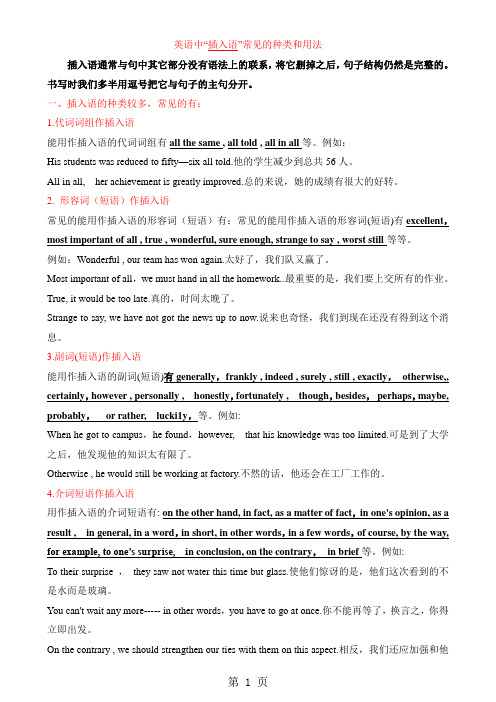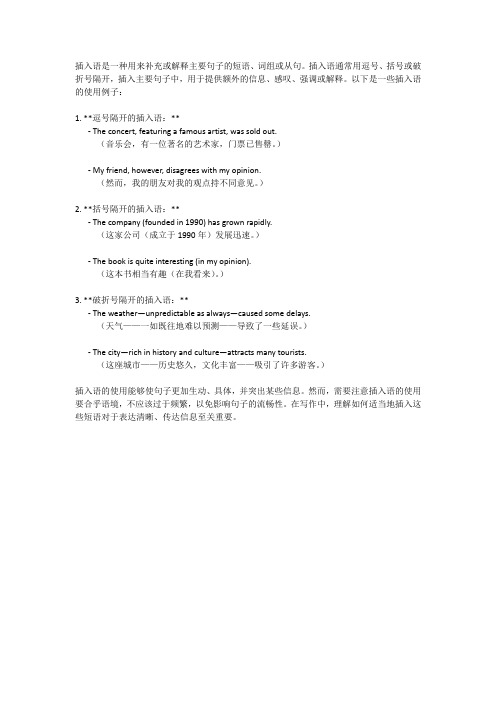插入语用法
高中语法专题解析插入语的种类和用法

高中语法专题解析插入语的种类和用法插入语是指在句子中起补充说明、加强语气或引起注意的成分。
在语法上,插入语不是句子的重要构成成分,但对于理解句子的含义和表达情感却起着重要作用。
本文将对插入语的种类和用法进行详细解析。
一、插入语的种类1. 感叹语:用来表达感叹或惊奇的情绪。
例如:"哇"、"天啊"、"好美啊"。
2. 感叹成分:用来表达感叹或惊奇的事物或人物。
例如:"这么大的房子啊"、"多么漂亮的花啊"。
3. 感叹词语:用来表示强烈的感情或情感。
例如:"太好了"、"太遗憾了"。
4. 插入语词:用来强调或补充说明的词语。
例如:"确实"、"实际上"、"毫无疑问"。
5. 拟声词:用来模拟某种声音或动作。
例如:"呼啦"、"碰"、"砰砰"。
6. 时距标志:用来表示时间或空间距离。
例如:"一年后"、"在那里"。
7. 专名、代词:用来指代特定名词或人物。
例如:"小明"、"玛丽"、"他"、"你"。
8. 人称词:用来指代特定的人称。
例如:"我"、"你"、"他"。
二、插入语的用法1. 前插语:插在句子开头,与主句相分离。
例如:"突然"、"顺便说一声"、"不知怎的"。
2. 后插语:插在句子结尾,与主句相分离。
例如:"我觉得"、"你知道吗"、"事实上"。
3. 中插语:插在句子中间,改变句子的语气或补充说明。
英语中“插入语”常见的种类和用法

英语中“插入语”常见的种类和用法插入语通常与句中其它部分没有语法上的联系,将它删掉之后,句子结构仍然是完整的。
书写时我们多半用逗号把它与句子的主句分开。
一、插入语的种类较多,常见的有:1.代词词组作插入语能用作插入语的代词词组有all the same , all told , all in all等。
例如:His students was reduced to fifty—six all told.他的学生减少到总共56人。
All in all, her achievement is greatly improved.总的来说,她的成绩有很大的好转。
2. 形容词(短语)作插入语常见的能用作插入语的形容词(短语)有:常见的能用作插入语的形容词(短语)有excellent,most important of all , true , wonderful, sure enough, strange to say , worst still等等。
例如:Wonderful , our team has won again.太好了,我们队又赢了。
Most important of all,we must hand in all the homework..最重要的是,我们要上交所有的作业。
True, it would be too late.真的,时间太晚了。
Strange to say, we have not got the news up to now.说来也奇怪,我们到现在还没有得到这个消息。
3.副词(短语)作插入语能用作插入语的副词(短语)有generally,frankly , indeed , surely , still , exactly,otherwise,, certainly,however , personally , honestly,fortunately , though,besides,perhaps,maybe, probably,or rather, lucki1y,等。
插入语

插入语英语句子中(尤其在口语中)常插入一些单词、短语或者句子,用来补充某些含义。
语法上称他们为“插入语”。
(一)插入语的类型:1、单词(多是副词),如:besides, however, otherwise, therefore, though 等。
e.g. She is looking fit, though. 他看起来倒是健康。
I can, however,discuss this when I see you.2、短语e.g. China and India, for example, are neighbours.By the way, where are you from?3、句子e.g. He is an honest man, I believe.Jack, as far as I know, isn’t clever.(二)插入语的位置通常插入语位于句中,并用逗号隔开。
但有时,也可位于句首或句末(见上面例句)。
也有时,并不用逗号隔开。
e.g. You know that I think you are wrong. 我认为,你明白你错了。
What on earth do you mean? 你究竟是什么意思?(三)插入语在句中的作用一般来说,插入语在句中不起主要作用。
如果把插入语抽去,句子的含义不大受影响。
但是,有的插入语却是句子不可缺少的一部分。
e.g. He got the news from nobody knows where. 他这消息谁也不知道是从哪儿得来的。
(四)插入语的特殊用法下面这种复杂的特殊疑问句,也可认为包含有“插入语”。
这种疑问句(有的语法书也称为“混合疑问句”或“连锁疑问句”)常用来征询对方对某一疑问点的看法、判断、认识、猜度或请求对方重复一遍说过的话。
口语中出现频率极高。
常用动词有say, suppose, guess, believe, consider, think, imagine 等。
插入语用法归纳

插入语用法归纳插入语用法很多,在句子中的位置比较灵活,在学习中应当认真去体会。
大体而言,插入语可以分为以下几类:1. 用简短的句子结构作插入语。
这类短语有:I think, I hope, I guess, I believe, I suppose, I wonder, I tell you, I say, I'm afraid, I'm sure, you see, you know, as you know, that is, that is to say, what's more等等,它们可以置于句中或句尾。
如:I suggest you choose someone who you think is kind and friendly.This diet, I think, will do good to your health.It won't be raining long, I hope.You will have to work harder, you know, if you want to succeed.2. 副词或副词短语用作插入语,这类插入语一般放在句首或句尾。
如:Happily for him, his father's second wife was kind to him too.You'll be able to pass the coming exam, surely.Luckily for him, he didn't hurt in the accident.Honestly, I don't need it at the moment.3. 介词或介词短语作插入语,这类插入语一般放在句首,有时也可放在句中。
如:Like most of my schoolmates, I have neither brothers nor sisters-in other words, I'm an only child.By the way, Bob sends his best wishes.On the other hand, I didn't know you were there.In short, things have begun to improve since schools were called on to reduce learning load.4. 分词短语作插入语。
英语插入语用法详解

英语中的插入语插入语一般对一句话作一些附加的说明。
它是中学英语语法的重点,也是高考的考点。
通常与句中其它部分没有语法上的联系,将它删掉之后,句子结构仍然完整。
插入语在句中有时是对一句话的一些附加解释、说明或总结;有时表达说话者的态度和看法;有时起强调的作用;有时是为了引起对方的注意;还可以起转移话题或说明事由的作用;也可以承上启下,使句子衔接得更紧密一些。
掌握这一语言现象不仅有利于对英语句子等的理解,还有利于提高写作等的水平。
插入语的类型较多,常见的如下几种:一、形容词(短语)作插入语。
能用作插入语的形容词(短语)常见的有:true,wonderful,excellent,strangetosay,mostimportantofall,sureenough等。
如:True,itwouldbetoobad.真的,太糟了。
Wonderful,wehavewonagain.太好了,我们又赢了。
Strangetosay,hehasn’tgotmyletteruptonow.说来也奇怪,他到现在还没有收到我的信。
Mostimportantofall,wemustlearnalltheskills.最重要的是,我们必须掌握所有的技巧。
二、副词(短语)作插入语。
能用作插入语的副词(短语)有:indeed,surely,still,otherwise,certainly,however,generally,personally,honestly,fortunately,luckily,though,besides,exactly,perhaps,maybe,probably,frankly,orrather 等。
如:Whenhegottothere,hefound,however,thattheweatherwastoobad.可是到了那儿之后他发现,那儿的天气太坏了。
Otherwise,hewouldstillbeathome.不然的话,他还会在家的。
了解中的强调句与插入语的用法

了解中的强调句与插入语的用法在语言表达中,为了更加准确地传达信息或者加强表达的效果,我们经常会使用强调句和插入语。
强调句是指通过语法结构和语气的变化来强调一些信息,而插入语则是在句子中插入一些额外的语言成分,用于注释、补充或者强调某个概念。
本文将详细介绍中文中的强调句和插入语的用法。
一、强调句的用法强调句是为了凸显某个信息而特别设计的句子,通过特殊的语法结构和重复的表达方式来达到强调的效果。
下面是几种常见的强调句的用法:1. 句型“是……才”这种句型常用来表达对比或者强调某种特定情况。
例如:“是你才能做到这样的成绩。
”这种句型中,“是”起到了强调的作用,突出了“你”这个人。
2. 句型“不是……而是”这种句型常用于强调两个相对的事物或者概念。
例如:“他不是聪明,而是勤奋。
”这种句型中,“不是”和“而是”起到了将注意力集中在“勤奋”这个方面的作用。
3. 句型“不是……就是”这种句型用于强调两种可能性,常用于列举选项或者对比不同情况。
例如:“他不是在家里,就是在办公室。
”这种句型中,“不是”和“就是”强调了两种情况的对立性。
二、插入语的用法插入语是插入到句子中的一部分,用于注释、补充或者强调某个概念。
插入语的存在不影响句子的整体结构,但可以使句子更加准确或者生动。
下面是几种常见的插入语的用法:1. 插入语的位置插入语通常放置在句子中间,可以插入到主语、谓语、宾语等各个部分之间。
例如:“我昨天,也就是星期三,去了一趟图书馆。
”这里,“也就是星期三”是插入语,用于解释“昨天”。
2. 插入语的结构插入语可以是一个词、一个短语或者一个从句。
例如:“我的哥哥,也就是上海交通大学的教授,已经发表了多篇学术论文。
”这里,“也就是上海交通大学的教授”是一个插入语,用于补充说明“我的哥哥”的身份。
3. 插入语的标点符号插入语通常用逗号或者破折号来与其他部分分开。
例如:“她终于找到了那本书,你知道的,那本全世界都在疯狂追捧的畅销小说。
插入语用法

插入语是一种用来补充或解释主要句子的短语、词组或从句。
插入语通常用逗号、括号或破折号隔开,插入主要句子中,用于提供额外的信息、感叹、强调或解释。
以下是一些插入语的使用例子:1. **逗号隔开的插入语:**- The concert, featuring a famous artist, was sold out.(音乐会,有一位著名的艺术家,门票已售罄。
)- My friend, however, disagrees with my opinion.(然而,我的朋友对我的观点持不同意见。
)2. **括号隔开的插入语:**- The company (founded in 1990) has grown rapidly.(这家公司(成立于1990年)发展迅速。
)- The book is quite interesting (in my opinion).(这本书相当有趣(在我看来)。
)3. **破折号隔开的插入语:**- The weather—unpredictable as always—caused some delays.(天气——一如既往地难以预测——导致了一些延误。
)- The city—rich in history and culture—attracts many tourists.(这座城市——历史悠久,文化丰富——吸引了许多游客。
)插入语的使用能够使句子更加生动、具体,并突出某些信息。
然而,需要注意插入语的使用要合乎语境,不应该过于频繁,以免影响句子的流畅性。
在写作中,理解如何适当地插入这些短语对于表达清晰、传达信息至关重要。
插入语的类型及其用法

插入语的类型及其用法插入语是一种附加成分,往往被人们所忽视。
但它富于表现力,能使语言丰富多彩,准确鲜明。
插入语的位置也较灵活,可以置于句首、句中或句末。
下面就其类型和用法谈谈自己的粗浅认识。
一、根据插入语的构成形式可分为8种类型,举例说明如下:1.“主语+及物动词”型:I think(suppose)我想,我认为;I believe我相信;I guess我猜;I hope我希望;You know你知道;You see你瞧,你明白;I wonder我想知道。
如:This,I think,is a good way to learn English.我想这是学习英语的好办法。
It belongs to me,you know.你要明白,这是我的。
2.介词短语型:in fact事实上;to one’s surprise(sorrow,amazement,joy)使人感到惊奇(悲伤、惊愕、高兴)的是;by the way顺便提一下;in other words换句话说。
如:To her surprise.she found herself in a different world.使她吃惊的是,她发现自己处在另一个世界。
By the way,have you seen the film Romance of the Three Kingdoms?顺便问一下,你看过《三国演义》这部影片吗?3.形容词引起的短语:sure enough果然;worst’still更糟糕的是;most important of all 更重要的是;most curious of all最为奇怪的是;strange真奇怪。
如:Strange.he often forgot to turn off the lights.真奇怪,他经常忘记关灯。
Sure enough,he came again the next day.果然他第二天来了。
- 1、下载文档前请自行甄别文档内容的完整性,平台不提供额外的编辑、内容补充、找答案等附加服务。
- 2、"仅部分预览"的文档,不可在线预览部分如存在完整性等问题,可反馈申请退款(可完整预览的文档不适用该条件!)。
- 3、如文档侵犯您的权益,请联系客服反馈,我们会尽快为您处理(人工客服工作时间:9:00-18:30)。
插入语用法英语插入语用法详解插入语一般对一句话作一些附加的说明。
它是中学英语语法的重点,也是高考的考点。
掌握这一语言现象不仅有利于对句子、篇章的理解,而且也有助于提高书面表达的写作水平。
一、常见的插入语有形容词(词组)、副词、不定式、现在分词短语、介词短语、从句以及固定短语。
1.常见的形容词(词组)、副词作插入语的有:sure enough(果然); strange; worse still(更糟糕的是);most important(最重要的是); honestly; obviously; however; otherwise; luckily; unfortunately; besides; first; second; especially; surprisingly等。
例如:Worse still, the lion could even carry off the baby in its mouth.We must do the experiment carefully; otherwise you'll get another result.Honestly, I don't need it at the moment.He likes the country, especially in spring.2.常见的不定式有:to tell the truth; to beshort(简单地);to begin with(首先); to be sure(自然、当然、果然);to be honest/frank; to make things worse; to make a long story short; to speak of(值得一提的是),to be fair ,to sum up(概括地说) 等。
这些插入语表示说话人的态度,在句子中作独立成份。
例如:________ the truth, this is all Greek to me.A. TellB. To tellC. TellingD.Told [Key: B]That's a good idea, to be sure!To make things worse, many of the men have gone off to cities in search of higher pay.3.常见的现在分词短语有:generally speaking; frankly speaking; judging from/by; talking of(谈到); considering(考虑到,因为是);putting it mildly(说得客气一点)等。
这些分词用来修饰全句。
例如: Judging from appearance, he seems to be a strong man.4.常见的介词短语有:in fact; in addition; ina word; on the other hand; in other words; in one's opinion; in that case; by the way; of course; as a rule(通常);to one's surprise; for example;on the contrary(相反);in a way(在某点上、在某种程度上); for one thing; for another (thing)等。
例如:In a way, I think we both won in the game.5.常见的从句有:if you don't mind; if you like; if you please; if necessary; if any; if I may say so; if convenient; as it happens等。
例如: You can, ________, come to join us in the game.A. if you pleaseB. if you possibleC. if you happyD. if you necessary [Key: A]6.常见的固定短语:as a result; that is (to say); what's more; as above; all in all(总之),等。
例如: All in all, they have had a wonderful time today.二、插入语的位置,可放在句首、句中或句末,一般用逗号或分号隔开。
例如:Besides, I enjoy learning about new things from politics to sports and music.He knows three foreign languages, namely, English, Japanese and Spanish.但是有些词或短语可插在句子中,不用逗号隔开。
例如:What on earth are you doing here?三、表示疑问的插入语结构含think, suppose, guess, say, imagine, expect, believe等动词的疑问句,后接含疑问词的宾语从句时,要将疑问词放在句首。
例如:Whom do you think I should see first?这一结构可改为:Whom should I see first, do you think?He made another wonderful discovery,________of great importance to science.A. which I think isB. which I think it isC. which I think itD. I thinkis [Key: A]这里I think是插入语。
which引导非限制性定语从句,故选A。
巩固练习:请选出最佳答案1. It is always difficult being in a foreign country, ________if you don't speak thelanguage. (NMET2000)A. extremelyB. naturallyC. basicallyD.especially2. ________be sent to work there? (上海2002)A. Who do you suggestB. Who do you suggest that shouldC. Do you suggest who shouldD. Do you suggest whom should3. Two middle-aged passengers fell into thesea ,________, neither of them could swim.A. in factB. luckilyC. unfortunatelyD. naturally 4. Never waste anything, and________, never waste time.A. after allB. at allC. in allD. above all5. His father came home at midnight, and________, he was drunk.A. as a resultB. that is to sayC. what's moreD. sooner or later6. My sister speaks English_____, if not better than, my brother.A. as wellB. as well asC. so wellD. so well as7 _____, you have given me a lot of help.A Tell the truth B. To tell the truth C.Telling true D. Telling truth8. _____his face, the young man must be over 20.A. Judged fromB. JudgedC. Judging from D .Judging9. I don’t picking up your thing from thestore ,____,the walk will do me good .A. sooner or laterB. stillC. in timeD. besides10. What he said,_____, has nothing to do with what he did.A. to my surprise B .to my surprised C. to my surprising D. to our surprisesKEY: DACDC BBCDA英语插入语的几种常见用法是英语语法中的一个重要考点,它是指插在句子中的词语或句子,其位置比较灵活,通常被逗号、破折号或句子的其他部分隔开,与句子的其他部分之间没有语法上关系。
插入语通常是对一句话的附加解释、说明或总结,有时表示说话人的态度和看法,有时起强调作用,有时是为了引起对方的注意,还可以起转移话题或说明原因的作用,也可以承上启下,使语句间的衔接更紧密。
插入语的种类比较多,常见的有以下几种:1.副词(短语)作插入语常见的有:indeed,surely,however,obviously,naturally,luckily,happily,fortunately,strangely,briefly,actually,altogether,further,besides,similarly,exactly,especially等。
如:Surely.I will keep the secret for my wholelife.Strangely,he hasn’t written to me for half a year.2.形容词(短语)作插入语常见的有:strange,sure enough,worse still,even better,hard to say,most important ofall,worst ofall等。
如:Most important of all,each of us fulfilled our own task.3.介词短语作插入语常见的有:to on e’s joy,in a word,in short,on the contrary,in other words,in a/some sense,in general,in one’s view/opinion,in conclusion,in reality,as a matter of fact,in a addition,in turn,in return,as a consequence /result等。
